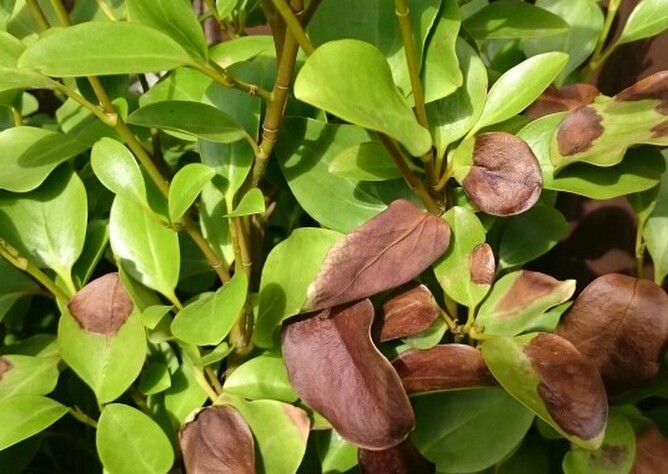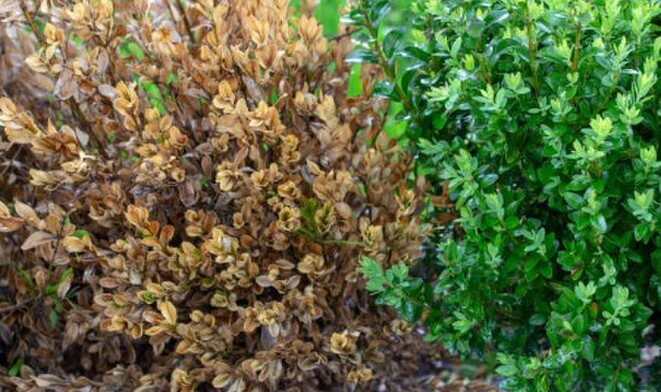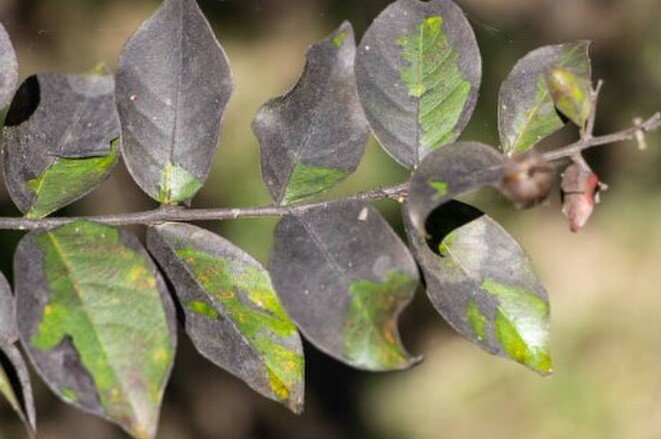Many of us wish to have a lush and healthy garden full of trees, plants, vegetables and blooming flowers. But unfortunately, numerous plant diseases in New Zealand affect our environment. Fungi, bacteria or viruses cause them.
Fungus disease is very diverse and can affect all plant parts, like the roots, stems, leaves, etc. Fungi, including black spots, rusts, moulds, and mildews, will attack various plants such as fruit trees, roses, vegetables and more.
This article focuses on diseases that we most commonly see when completing tree work in Hamilton's residential areas.
Griselinia Root Rot Caused By Phytophthora
What is Phytophthora?
Phytophthora is a type of root rot existing in the soil. If left untreated, it can cause the decay of roots in plants. In fact, moist soil is a suitable habitat for these fungi. So, it’s vital to have good drainage for the plant. When there is too much water near the roots, Phytophthora spores will travel and can reach the plant’s roots.
It’s essential to add that phytophthora affects many other plants, not just Griselinia.
Symptoms
The plant may become yellow or brown when infected with root rot. They can even fall off. These symptoms can worsen if left untreated. In addition, the plant could die because it won’t be drinking water properly.
Solution
If you notice the symptoms listed above, we recommend testing the soil. If it comes back positive with the disease, you may want to consider treating the plant as soon as possible.
Remove affected plants
Replace the soil with fresh topsoil to prevent further spread
Prevention
We have seen more and more Griselinia diseases this year because it has been extremely dry. The plant roots get easily damaged because it doesn’t have enough energy to absorb from the dry soil. The Phytophthora will then attack the specie.
Since this disease spreads fast, we recommend not planting this hedging shrub and looking for alternative species not susceptible to root rot, such as Buxus, Taxus, Ribes, etc.
However, if you already have Griselinia hedges around your property, we recommend doing these steps to prevent the spread or formation of the root rot:
Increase drainage of the soil
Improve the general soil’s health
Add mulch
Buxus Blight
What is Boxus Blight?
Buxus blight is a fungal disease caused by Cylindrocladium buxicola, affecting the Buxus species (Box). This disease doesn’t kill the roots, but it will weaken the plant. However, if you catch it early, recovery might be possible.
Symptoms
This disease causes leaves to brown and fall off. In addition, it can infect young stems and cause black streaks.
Solution
If the plant is infected:
Prune out the infected limbs
Sterilise your equipment between plants
Remove all leaves under the plants
Spray foliage with a fungicide called Buxus Blight Fighter
Prevention
Check your plants for any signs of the fungal disease
Prune once a year as it will reduce the risk of spreading
Ensure a good airflow around your plants
Water at the base of the plant
Improve your soil’s health by adding mulch around the trees
Sooty Mould
What is sooty mould?
Sooty moulds are caused by Ascomycete fungi. They grow on the sap from plants and produce a sweet honeydew as a waste product discharged by insects like scale and aphids. The mould then expands on the honeydew. However, the mould doesn’t feed on the plant; it covers the leaf surface, blocking the light and reducing photosynthesis, vital for plant growth.
Symptoms
The sooty mould forms a thick black coating on the tree's trunks, branches, and leaves.
Solution
Spray with insecticide to control the sap-sucking insects
Spray with a fungicide to kill the mould
Prevention
Grow a variety of different plants to build an appropriate habitat for beneficial insects that predate on pests
Create good airflow between plants
These diseases aren’t always easy to find, so contact us for advice or information.


